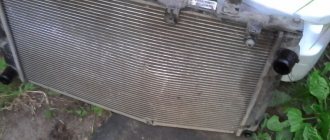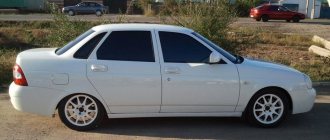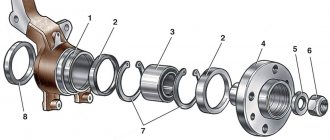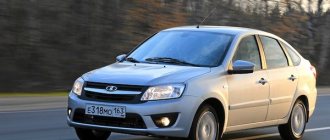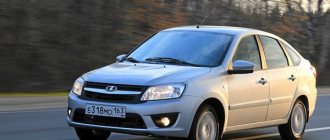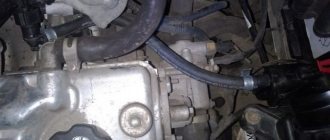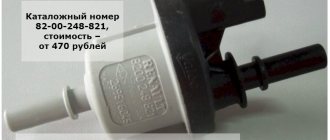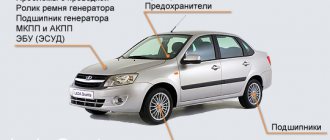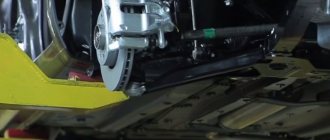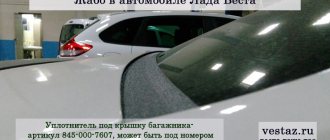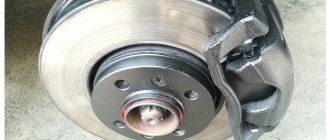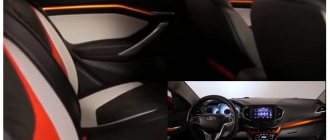Front suspension of Lada Vesta
Creaking from behind the car
Despite the fact that a modern car is not only a high-tech vehicle and is manufactured to the most advanced standards. Even they have problems. These faults can manifest themselves as a knocking sound in the front suspension of the Lada Vesta.
Although the suspension turned out to be successful, malfunctions periodically arise, which the manufacturer analyzes and makes recommendations for eliminating squeaks in the Lada Vesta. They may appear as extraneous sounds or knocks.
Rattle in the front suspension on Lada Vesta
The most common cause of squeaking is the stabilizer bushing
The increasing grinding noise of the front suspension of the Lada Vesta is especially worrisome, because the main load is concentrated here, the steering and braking systems are located, the condition of which must always correspond to the norm.
A front-wheel drive car, as in our case, is prone to problems with the nose.
The increasing grinding noise of the front suspension of the Lada Vesta is especially worrisome, because the main load is concentrated here, the steering and braking systems are located, the condition of which must always correspond to the norm.
Problem with stabilizer links
The problem with squeaks in the front suspension can be solved by replacing the stabilizer bushings with polyurethane.
What else could be wrong with stabilizers? The design has a strut that is attached to the shock absorber body and the cross member of the stabilizer itself. It has two fingers as fastening. Without diagnostics at a service station, it will not be easy to figure out whether there is a breakdown in this unit, but you can try.
Creaking noise when reversing the vehicle
The Lada Vesta sedan, which opened the newest chapter in the history of AvtoVAZ, has been on sale for 18 months, and during this period of time it has not only managed to show all the “childhood diseases” that inevitably make themselves felt when the newest model is released, but has also gone through a series modernizations to remove all tasks. Did it work out?
It is curious that virtually all the tasks of the “Vesta” - as if by choice - are combined with nasty squeaks, rustles, crunches and other unnecessary sounds that force the owners to swear and call their own old car, in general, an old ungreased cart. At home are the problems encountered in the version with a manual AMT gearbox and a brand new 1.8-liter engine, but we already mentioned this when we studied the diseases of the Lada Xray. As for unnecessary sounds, AvtoVAZ states that all these squeaks have been found and corrected, so that they no longer have to exist on the newest cars. So what actually creaked?
Stabilizer bushings creaking
Until recently, the creaking of stabilizer bushings on Vesta was considered almost the most widespread problem: almost nine out of 10 owners complain about annoying sounds when driving over bumps. Instead of original bushings, analogues from other brands were prescribed, rubber was replaced with polyurethane, “non-original” rubber bands trimmed and modified locally. This often helped for a while, but after several thousand kilometers the sound often returned again.
The noise was caused by an insufficient amount of lubricant and poor properties of the bushings themselves. Official dealers could lubricate or change the part under warranty, but this usually only helped for a short time. But both dealers and the manufacturer claim that a solution has already been found: the composition of the bushing material has been improved, and on the newest Vestas the creaking has already been overcome.
Creak of stabilizer struts
And again the words “creaking” and “stabilizers” end up in the same sentence. Now we are talking about the stabilizer struts, which also began to creak and knock quite noticeably when driving over uneven surfaces, even at very short distances.
The reason for the creaking was hidden in the ball joint liner, which began to rotate and play, causing unnecessary sounds. Measures to solve the problem have already been taken: configurations were made to the system, the ball joint body was modified, and now the liner is fixed firmly and does not make unnecessary sounds.
Creaking and crunching when turning the steering wheel
We continue to listen to the Vesta squeaks and move to the front shock absorbers. It was here that the source of another type of squeaks and rustles settled down, which often appeared when turning the steering wheel, especially in wet weather. The whole point is again in the rubber band: the gasket in the upper part of the shock absorber, separating the spring from the support bearing, could at times touch the support bearing itself. This was the reason for the nasty sounds.
In general, this source of sound has already been “muffled”: the manufacturer adjusted the dimensions of the rubber gasket and changed the composition of the material from which this gasket is made, which helped to overcome the noise.
Rear shock absorbers knocking
In the end, the extreme source of squeaking in our review is now in the rear of the car. Until recently, the knocking sound of the rear shock absorbers when driving over bumps was also a “calling card” of almost all Lada Vesta models. In this case, the prerequisite was the upper support of the shock absorber, or more precisely, the rubber hinge located in it.
The rubber joint was replaced with the hardest and most “tenacious” analogue, made from a different consistency composition. Therefore, again, the resistance of the rear shock absorbers to Russian roads has increased, and excessive noise should no longer appear on low mileage on the newest Vestas.
Glass scratches
The last one on the list of solved problems has nothing to do with knocking, and even here it didn’t work out without tires! Owners of Lada Vesta often noticed that quite noticeable abrasions and scratches remain on the front windows if they are lowered and raised.
Official representatives were often approached with a problem given to us, and its essence was hidden in the window seal, which turned out to be very hard and fit very tightly to the glass - hence the abrasions.
In general, it is worth recognizing that the manufacturer was one of the first to solve this problem, long ago and quickly: firstly, the rubber composition of the seal itself became softer, and secondly, its profile changed in such a way as to give the glass a little more “freedom”.
Obviously, the owners of classmates and competitors can gloat and be completely convinced that they literally made the right choice and purchased the most reliable and problem-free machine. But there are no perfect cars, and the fact that your favorite model has not yet appeared in this section for us means only one thing: we just haven’t gotten to it yet.
Thank you for sharing the link to this page!
I drove 480 km and found a nasty squeaking sound from the rear brake pads, which turned into a rumble when reversing. After researching the issue, I realized that there was a problem with the brake pads. Also, the unique brake pads have been reported to be very hard by people and can lead to excessive wear on the brake rotors over time. I don’t see any point in changing the pads at the dealer because... They will put exactly the same ones. The cost of an unusual set of rear pads at the dealer is approximately $35 and the cost of labor to replace them is about $20, if this is important to someone. Therefore, I decided to purchase a full set of pads (front/rear) from Lukas.
Article number of front pads LUCAS/TRW GDB3332
— cost per set is about $27 Article number of rear pads LUCAS/TRW
GDB1384
— cost per set is about $20
Good day! When driving in reverse, with the clutch depressed and the gear engaged, a rattling sound is heard. When driving in reverse with the gear (reverse) engaged, there is no sound. When driving in reverse with the gear off, there is no sound either. what could this mean? The dilemma is already a year and a half old, the car is 2.
Other causes of squeaks in the front suspension
The front suspension is designed reliably, similar to foreign brands, taking into account long-term use.
Quite often, extraneous squeaks are caused by brake calipers.
There are isolated cases where the following types of breakdowns have occurred over time:
- The silent blocks of the steering gear levers require replacement, which are extremely inconvenient to remove.
- Brake calipers may gradually begin to click, replacing the pins may solve this problem.
- A small play appears in the place where the strut cups are attached to the body, associated with wear on the threads of the mounting bolts.
- The silent blocks of the steering gear levers require replacement; removing them is extremely inconvenient.
- Brake calipers may gradually begin to click; replacing the pins may solve this problem.
- A small play appears in the place where the strut cups are attached to the body, associated with wear on the threads of the fastening bolts.
conclusions
If the service life of some units has come to an end, then they need to be replaced urgently, since one breakdown can lead to others, and the entire mechanism will go into disarray.
If we return a little to squeaks, then with significant fatigue of the ball joints, steering tip and rack, failure of the shock absorber, or its broken supports, unnatural irritating sounds may appear. Then it is best to go for a diagnosis and then treat the problem.
Despite the fact that a modern car is not only a high-tech vehicle and is manufactured to the most advanced standards. Even they have problems. These faults can manifest themselves as a knocking sound in the front suspension of the Lada Vesta.
Although the suspension turned out to be successful, malfunctions periodically arise, which the manufacturer analyzes and makes recommendations for eliminating squeaks in the Lada Vesta. They may appear as extraneous sounds or knocks.
Recommendations from repairmen
Reliability and long service life of the suspension are among the priority characteristics of the car. Even at the design stage, engineers set the task of developing a suspension that would be maximally adapted for domestic roads.
The result turned out well; the design even caused delight and surprise among some car enthusiasts. The average resource of suspension elements exceeds 100,000 km. Despite a number of positive aspects, there is always a fly in the ointment.
Rate the article!
Defects of Lada
Lada Vesta has recently rolled off the assembly line and not all warranty workshops have experience in solving problems on how to eliminate knocking noises that occur in the suspension. The manufacturer constantly maintains contact with the service station and makes changes to the design. Let's consider possible malfunctions and methods for eliminating them in the front suspension of the Lada.
Car enthusiasts may be disappointed by a new car almost immediately. An unpleasant creaking and knocking sound appears when passing speed bumps. Upon analysis, it turned out that the problem was in the stabilizer bar bushings.
It is not recommended to lubricate them with grease; they will stop squeaking, but for a very short period of time, so they only need to be changed. They can be replaced with polyurethane ones from Niva Chevrolet. The bushing has catalog number 17012680. After replacement, the squeaking sound disappears.
You should know that these are not all problems; a characteristic knocking sound may occur from the front right.
This is typical when there is increased play in the right ball joint. Replacement is carried out together with the suspension arms assemblies. AvtoVAZ supplies them complete with a ball joint. Front suspension of the Lada Vesta The main defects that occur in the front part of the Vesta car, which may cause the car to creak or rattle:
- Grinding noise in the anti-roll bar;
- The right ball joint is faulty, it starts knocking;
- The stabilizer links begin to rattle.
It is recommended that all these defects be repaired at AvtoVAZ dealerships.
When driving on an uneven road, you hear a dull knock on small bumps or a sound reminiscent of rubber friction. This problem can be eliminated by lubricating the Vesta muffler mounting with grease. Vesta's front suspension creaking may be due to worn struts.
Minuses
Drivers say that the front discs wear out very quickly on all versions of Vesta. You have to change them at 50 thousand km or earlier.
This depends on the operating mode. If the car is used in a town with rapid acceleration and braking, then the wheels can be worn out within 30,000 km. If the driving is mainly suburban and measured, then you can drive 150 or more thousand km. But you shouldn’t make a big deal out of this, because the main thing is for the car to brake well. My car is 6 months old, I have driven 6000 km.
If you have already changed the wheels on your own car, share your opinion in the comments on what mileage it happened at. If they are not worn out yet, then write what kind of machine you have and how worn the discs are.
Self-diagnosis of problems
If there is a knocking sound in the steering wheel or the Vesta suspension rattles, you should immediately contact the dealership.
If this is not possible, you can diagnose and identify problems yourself. To do this, just hang up the Lada wheels and do the following work:
- Let's rock the wheels in different planes; if play is felt when the brake pedal is released, this indicates that the hub bearing has failed;
- If there is a problem with the suspension, play is felt regardless of whether the brake pedal is pressed or released;
- If the ball joint is defective or the strut is poorly secured, play is felt in the vertical plane;
- Failed tie rod ends are accompanied by play in the horizontal plane.
Thus, it becomes clear why the front suspension of the Lada Vesta creaks. It is not recommended to drive with such defects; if they are detected, you must contact a service station. And at the dealership they will conduct a full diagnostic of the chassis and not only give recommendations on how to eliminate the crunching sound in the front suspension, but will also carry out the repair work in a qualified manner.
If you don't like the way your vehicle drives over obstacles after a while, or turns into turns less smoothly. First, carry out diagnostics to eliminate other “suspects” and come to the technical center with a clear task for specialists:
- Release the brake pedal. Take the wheel with both hands by the opposite parts and rock it. If a pronounced play is noticeable, this may mean that the problem is in the hub bearing - it must guide the wheel correctly, strictly in one plane; if it is neglected, it can “go figure eight”.
- If the wheel play does not occur due to the hub, then the fault is in the chassis. In this case, play appears even when the brake pedal is pressed.
- If the car “wobbles” in a vertical plane, the stabilizer link is poorly secured or the ball joint is worn out.
- If the car wobbles “horizontally” (push it into the front fender, after tightening the handbrake), it may be that the rod ends have worn out and become unusable.
How to solve the issue without substitution
I decided to fix the problem using the other method that was suggested to me. I tried to swap the pads and grind them down on their edges. If this doesn't help, I'll create a replacement.
I decided to apply all the tips I found on the Internet. I took off the pads, cleaned everything, ground down their edges, and swapped the inner ones with the outer ones.
I bought two types of lubricant:
- For the non-working surface of the pad.
- For the surface that comes into contact with the caliper.
I collected everything for the space, but there are huge doubts about such actions. As long as I drive for a few days, everything is fine. If the brakes start squeaking again, then I will change the front and rear pads.
If your machine makes similar sounds, be sure to write in the comments. AvtoVAZ is probably watching reviews of its products and listening to the views of the owners of the Lada Vesta.
Soon there will be an update of the car and its restyling. I would like the factory engineers to remove all the bugs that exist in the newest cars.
Source: xn—-21-43dabppn4d4dn.xn--p1ai
Problems with noise and squeaking from the rear of the car
Creaking from the rear of the car Malfunctions can also manifest themselves as a knocking sound in the rear suspension when driving over uneven surfaces or a creaking noise from the rear. All these sounds signal a problem that needs to be solved. In order to remove it, as recommended by the factory, it is necessary to cut out the gasket and install it on the upper shock absorber support. This will eliminate knocking in the Lada Vesta suspension.
Poorly spun wheels can crunch and squeak. This often occurs on other car models and is caused by the car owner’s carelessness when changing wheels. It is urgent to stop and tighten the wheels.
Poorly packed items in the trunk of a car can make knocking and crunching noises. Before trying to eliminate suspension squeaks, you should empty the trunk of all unnecessary things and drive the car.
If there are no extraneous sounds, then the issue is resolved. Sources of extraneous noise from behind can also be minor problems, but to eliminate them you need to know them:
- The handbrake cable is not secured, just tighten the tie;
- The trunk lid dampers may make different sounds; they should be lubricated with silicone grease;
- With increased play, the trunk lid begins to rattle; lubricate and eliminate the play;
- The locks of the rear seat back may squeak, just lubricate and wrap a little electrical tape;
- Things are poorly packed in the trunk.
The engine is the holy of holies of any car, and therefore, when extraneous sounds begin to be heard from under the hood, car owners immediately sound the alarm and try to figure it out.
Knock of calipers and nasty sound
If you knock on the wheel, you may hear a knock from the caliper. On my car they don’t knock, at least not yet. There are also complaints about the annoying sound heard from the disc brakes at the rear. My car has it too. The sound is like a piercing, drawn-out howl.
It is not heard all the time. If you were driving around a town, braked, drove backwards and began to slow down. At this moment a disgusting sound is heard. Where this sound comes from is unclear. There is no noise when moving forward or braking.
This affects the style of the car. When choosing a car, a client at a car dealership on a test drive may give up on the purchase after hearing the disgusting sound of the brakes. Naturally, this does not affect the speed; the fault can be eliminated by replacing the brake pads. But then a question arises for AvtoVAZ: “Why should Vesta owners change the pads on the newest car?”
In this case, a replacement has to be made with non-original pads. If you install factory ones, this will not change the situation.
On economical foreign cars, owners try to replace them with unique spare parts after the pads wear out. If they install non-original ones, it’s just to save money. We are buying the latest car. And in order not to listen to nasty squeaks and squeaks, you must replace the parts with non-original ones!
Loose wheel bolts
The situation when the fastening bolts of one or several wheels have become loose is typical not only for Lada Vesta, but occurs frequently. There can be many reasons - from inattention during tire fitting to an unsuccessful attempt to steal a wheel.
If a knocking sound occurs while driving, the first step is to perform the most accessible action - stop the car and check the tightness of the wheel bolts, since a tire that falls off while turning can cause the car to roll over with unpredictable consequences. In this case, diagnostics is inseparable from troubleshooting.
After tightening the bolts or making sure that the reason for the knocking is not their tightening, you can continue driving. If the problem is not solved, you should not put off diagnosis for a long time. In order not to aggravate the situation when one malfunction causes another, it is strongly recommended to contact an authorized dealer as soon as possible for qualified diagnosis and elimination of the causes of knocking or other abnormal suspension noises performed on a car raised by a lift.
Vile rumble when reversing
I read the forum - I don’t see anyone having this problem, but on my cross (1.8, AMT, 6500 km) when moving in reverse, at times there is a sound as if a brake pad or something else was rubbing against something iron, while emitting not a crackling sound, but an ominous roar. Who came across it? Haven't been to the OD yet. I'm waiting for scheduled maintenance.
The last time was ruled by Yuri Chub; 03.08.2018 at 11:41.
They wrote about this somewhere on the forum. This also happens to me from time to time (1.6 MT). What is this is unclear =)
1.8 MT. The same garbage. I wrote this somewhere on the forum. The feeling that either the pads do not come off completely, or the calipers are the brain (the central section of the nervous system of animals, usually located in the head section of the body and is a compact accumulation of nerve cells and their processes)
have. Because if you press the brake a little during the rumble, the rumble is lost. I told the dealer, but I couldn’t show it, because this doesn’t happen all the time. Most importantly, it happened in the winter, even less often in the summer. Therefore, the dealer did nothing failed. At the same time, it doesn’t matter if you go backwards in gear or just roll downhill in neutral - the sound is still there.
The same bullshit happens from time to time, I press the brake quietly and it goes away. I don't think the pads are coming off completely
Rear disc brakes. This means there is a protective case. A pebble may fall under it, or something has already “fell off” and is rubbing. Sometimes it will grind forward, then it will grind backwards and fly out. It is impossible to see what is under the casing - it covers the disk. Lift the wheel and spin it. If yes, then remove the wheel, then unscrew it, discard the caliper, unscrew and remove the brake disc.
. Naturally, if the block does not rub with iron. but unscrew and discard the caliper and it will be clear.
Last time was ruled by Vik; 08/22/2018 at 22:49 . Reason: clarification
A couple of times this happened to me when I started moving backwards. And now it has come forward almost at a stop. There's something wrong with the pads. Nothing could get into the defense. The mileage is only 4500. What is there, the springs are pressing for sure. We'll have to move back to the hands and watch.
Later, tell me that you found it. I was unable to present this malfunction to the officials. Because before this the machine was always parked in the box and after a warm room the malfunction did not appear
Source: sw-cross.ru
